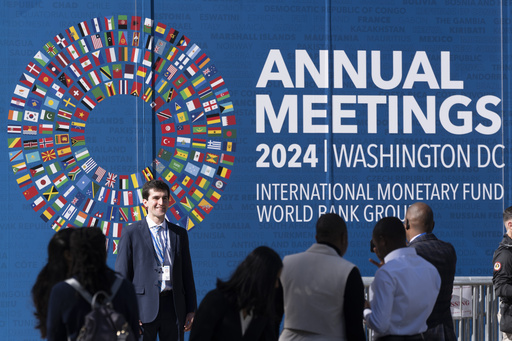
In a recent address, Treasury Secretary Janet Yellen conveyed to global financial leaders that the U.S. economy has experienced notable growth, attributing this improvement to the Biden administration’s rejection of isolationist policies. This statement can be interpreted as a subtle critique of former President Donald Trump’s approach, coming just weeks ahead of the pivotal U.S. election.
During the opening of the annual meetings of the International Monetary Fund (IMF) and the World Bank, Yellen detailed the recovery of the U.S. economy following the devastating impacts of the COVID-19 pandemic. While she refrained from directly naming Trump, in her prepared remarks, she emphasized that the Biden administration had moved away from an era of international detachment, which “made America and the world worse off.”
Yellen highlighted the turnaround in the job market, stating, “We went from millions having lost their jobs to a historic labor market recovery.” She also pointed out that the growth of the U.S. economy has been “almost twice as fast as most other advanced economies this year and last, even as inflation came down sooner.” This year’s meetings mark the final significant international financial conference under the Biden administration, coinciding with growing economic concerns among American voters. Republicans have attributed the rise in inflation, which reached a 40-year high before beginning to decline, to the actions of the Biden-Harris administration.
In a September debate, Trump criticized the current administration, claiming it “destroyed the economy.” A recent survey conducted by The Associated Press-NORC Center for Public Affairs Research reveals that voters are still divided over whether they prefer Trump, the Republican nominee, or Vice President Kamala Harris, the Democratic nominee, to address vital economic challenges.
The outcome of the U.S. election is anticipated to have significant implications for global finance and the international economy. Both Trump and Harris have largely refrained from outlining their visions for the IMF and the World Bank, although they do hold contrasting views on trade and tariffs. Trump has expressed skepticism towards global financial organizations and has proposed imposing substantial tariffs if he is elected. Conversely, Harris is expected to uphold the Biden administration’s stance that promotes international cooperation, albeit she has shown support for certain tariffs as well.
While Yellen, following the guidelines of the Hatch Act, is prohibited from engaging in partisan political activity, her remarks seemed to favor a potential Harris administration by commending Biden-Harris policies regarding climate, health care, and infrastructure among other matters. She referenced Trump’s isolationist stance by stating, “From day one, we rejected isolationism that made America and the world worse off and pursued global economic leadership that supports economies around the world and brings significant benefits to the American people and the U.S. economy.”
Trump, who has adopted isolationist ideologies and been critical of multilateral institutions, has pledged to impose a 60% tariff on all Chinese goods, alongside a universal tariff of 10% to 20% on other imports, contending that foreign producers would absorb these costs. However, many economists argue that these tariffs would essentially be a tax on American consumers, potentially hampering economic efficiency and driving inflation higher in the U.S.
The current administration has maintained some of the tariffs established during Trump’s presidency, including new tariffs on Chinese electric vehicles, advanced batteries, solar cells, steel, aluminum, and medical equipment that were imposed in May. Tuesday morning is set for the IMF to issue its updated global economic outlook, which will feature revised statistics on U.S. economic growth.
